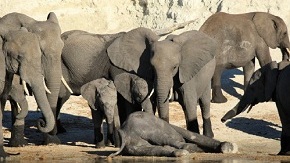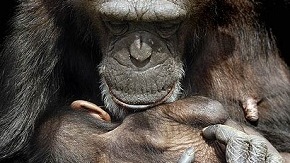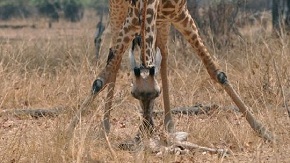This blog comes with a warning for animal lovers: ‘beware, have the tissues at the ready'. Todays blog is all about how animals mourn their dead. While many scoff at the very notion of such a thing there is evidence to suggest that animals do indeed process death. They do so by exhibiting different behaviours and through a menagerie of rituals, yet the overall demeanour of these animals changes in the same inexplicable way; exuding an aura of deep depression and sadness. Strangely enough a great deal of these animals reside in Africa, so were going to give you Africa's top five animals known to mourn their dead.
Elephants
The fact that these magnificently intelligent creatures top our list should come as no surprise. Elephants react to death in a variety of different ways and do so within many unique contexts. One example of this is glimpsed in the reaction of an elephant mother, Tonie, to the death of her newborn calf. Tonie refused to leave its side, even after the rest of her heard had moved on. She stood out under the scorching sun defending the calf against all comers, including lions, for four days. There are also many instances on record of baby elephants waking up screaming if they witness their mothers being murdered and a story of a family of elephants attempting everything to wake up a dead family member, from sitting her upright to placing grass in her mouth. Another known ritual involves the ‘burying of the deceased. Elephants will place dirt and branches over their dead group member and stay with the body for a period of several days, they have also been known to exhibit such behaviour to humans as well.

Chimpanzees
A young chimp named Flint reacted to the death of his mother Flo with harrowing grief. As observed by chimp expert Jane Goodall, Flint was overly attached to his mother and failed to leave her care at the usual age. Depression quickly set in to the young chimp but his older brother, Figan, and the rest of his group managed to cheer him up for a while. But shortly after, Flint left the group and returned to the place of his mothers death from old age. He refused to eat and became increasingly ill, appearing a shadow of his former self; seeped in depression and gaunt. After weeks spent pining Flint curled up and passed away himself only but a few feet from where his mother died.

Baboons
When Sylvia the baboons grooming partner and daughter, Sierra, was killed by a lion she looked to other members of her group for support. It caused the otherwise snobbish monkey to look to those below her hierarchical ranking. Scientists noticed there was a rise is Sylvia's glucocorticoid levels at the time of the incident. Glucocorticoid relates to stress levels in the body, so it was clear that Sylvia found the experience less than pleasant. Her embrace of lower ranking females for company and companionship is proof of her desperation through grief.
Gorillas
Gorillas are similarly emotional creatures. After the loss of their matriarch, Babs, the effect upon her fellow gorillas at a zoo in Boston was one disconcertingly human. Her mate picked up a piece of celery; her favourite food, and placed it in her hand, banging his chest and howling in grief. Thereafter a wake was held and the zoo allowed the gorillas to file in to where Babs body lay and pay their respects, which, one by one, they did. They stroked her stomach and held her hand in a stark display of woe.

Giraffes
It is quite rare to see giraffes mourn but that's not to say they don't. There are a few known cases, one of which took place in Zambia. A giraffe mother was seen watching over her calf that appeared to have been a stillborn. The giraffe splayed her legs so she could reach down to her dead calf, before spending time licking it. She was seen to repeat these actions several times and stayed with the calf for over two hours; inspecting and examining her lost one. It is curious behaviour to begin with but is more unusual still, as she had allowed herself to become separated from the other females; a great rarity among female giraffes as they like to stay close to one another.
So there you have it, it would appear animals know and feel a lot more than some of us would give them credit.

